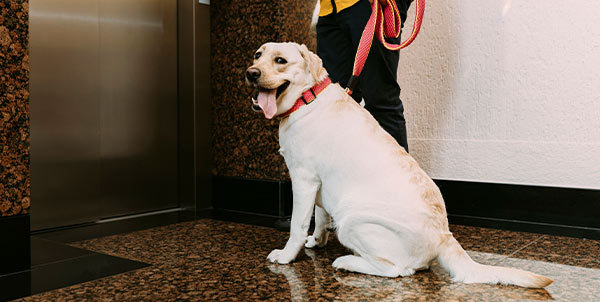Table of Contents
Animals and dogs in apartment buildings: when the ugly beast is the neighborhood
Are there any legal regulations that can prohibit the presence of pets and dogs in condominiums? The answer is NO.
It is true, however, that while the Law protects animals and their keepers, it is important that they know and apply a few simple rules.
A little care in the management of cats and dogs in condominiums is all that is needed to ensure a civilized coexistence with all condominiums, even those who dislike cats and dogs and the like.
Help! The neighbors are threatening me!
Your behavior is beyond reproach, your pet polite, but yet your neighbors express hostility or worse, threaten you?
However annoyed, rightly or wrongly, by the presence of an animal, no one is allowed to mistreat, harm, or worse, kill it.
Therefore if a neighbor explicitly threatens you and your animal or if it is even unknown the perpetrator of the threats immediately file a complaint with the Municipal Police, State Police, Carabinieri.
Dogs in condominiums: what the civil code stipulates
A recent provision in the Civil Code has liberalized the entry of dogs into condominiums and to all pets in general.
Revolutionary news, then: condominium bylaws cannot prohibit owning or keeping pets.
The dog and cat, specifically, should be considered as part of the household.
Prohibiting a condominium tenant from having it in their apartment is tantamount to restricting their personal and individual rights.
No condominium bylaws can, therefore, set limits on the rights and powers of condominiums over the exclusive enjoyment of their property.
Civil Code articles “friendly” to animals and dogs in condominiums
Art. 1138 C.C.
“The rules of the regulations cannot in any way impair the rights of each condominium owner. The rules of the regulations may not prohibit owning or keeping pets.”
Article 844 C.C.
“The owner of a property may not prevent the immissions of smoke or heat, exhalations, noises, shaking and similar propagations arising from the neighbor’s property, if they do not exceed the normal tolerability, having regard also to the condition of the premises.”
Dogs in condominiums and use of common parts
Having ascertained that the keeping of a pet within one’s own home cannot be prohibited, how does one rule when the use of the common parts of the condominium is challenged?
Do condos rail against you if you give your dog a “ride” in the elevator or go up the stairs together?
Know that the ground on which the building stands, the foundations, main walls, roofs and solar slabs, stairs, entrance doors, vestibules, doorways, porches, and courtyards are in common use: each condominium owner has the right to use them albeit in accordance with sanitation, decorum, and quiet.
Here is the normative reference: the
art. 1137
of the Civil Code.
If condominiums complain about lack of hygiene and decorum
Well, it is up to them to prove the “crime.” They must prove with objective data (i.e., a party report to be obtained from Municipal Police, ASL, licensed technicians) that the animal is causing deterioration of common parts, filth, or is carrying diseases.
In this regard, always keep with you an up-to-date certificate from your veterinarian stating your pet’s good health.
Condominium resolutions and bans: they are legally void
Does a condominium resolution contain provisions or prohibitions to the detriment of the animal?
Know that it can be cancelled.
Here’s what to do:
-If the prohibition or provision does not appear among the items on the agenda of the condominium meeting, but among the “miscellaneous and contingencies,” the resolution may be considered null and void (i.e., producing no effect).
In that case you just need to send a registered letter with return receipt to the administrator.
-If the ban was dealt with on the agenda, on the other hand, you can appeal to the Justice of the Peace within 30 days from the date of the resolution or the date of receipt of the Minutes. Simply describe the vexatious situation you are a victim of, attach the assembly minutes and documentation showing the animal’s good health status.
The only exception
There is an exception.
If you are in the process of buying or renting a property, before signing the contract, ascertain whether or not there are Contractual Regulations, which are regulations drawn up by the builder of the building.
If such a regulation exists and includes the clause prohibiting the keeping of animals in the home, it prevails over the rules of the Civil Code because it draws binding force from the express will of the contracting parties.
Attention, therefore! Inform yourself in advance.
Common sense: the secret of civilized coexistence
Common sense must never fail.
There is a need for animal keepers to adopt a respectful and responsible attitude to protect their animal, while respecting hygienic regulations and the quiet of other apartment buildings
-Supervise your dog’s health status.
-Submit him for microchipping, worming, vaccination, parasite treatment, periodic checkups. A healthy animal poses no danger to either its fellows or humans.
-Dogs should always be led on a leash and with a muzzle in tow: do not let them run wild. There are some people who do not like contact with animals. –
-Always carry bags to collect droppings and rinse the spot where the dog peed. A healthy and clean environment is usable by all.
-Don’t leave your dog alone at home for more than 5 consecutive hours. If he barks and annoys the neighbors, he is basically just expressing discomfort. But this the condominiums may not understand and point it out as a “nuisance animal.”
-Turn to a Dog Educator who can explain how to get your dog used to not suffering the “abandonment syndrome” when you leave for work and are forced to leave him alone in the house.
-Please take out a liability insurance policy for damages caused by your pet against third parties. As cautious as you may be, animals, you know, are unpredictable and can get up to some mischief.
In addition, the insurance policy may provide reimbursement for veterinary expenses following surgery from injury or illness. This is also a form of prevention.
Clinica La Veterinaria also protects the health and well-being of your pet through the advice of Dog Educators who can help you properly manage your dog inside and outside the home: request a consultation.
We would also like to remind you that Clinica La Veterinaria is always open h24 every day including holidays and with First Aid service from 8 pm to 8 am.
For the joy of seeing them HAPPY.











